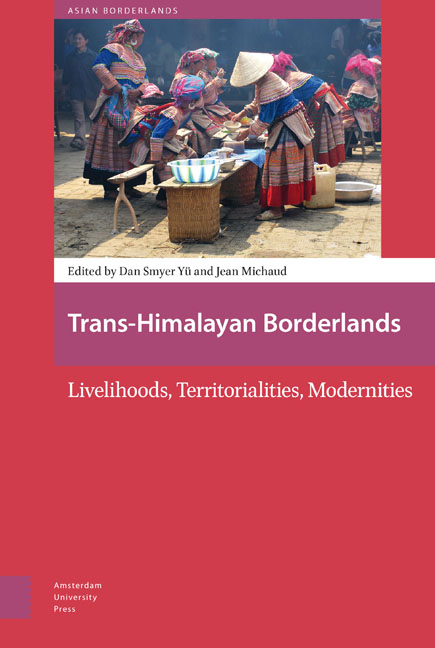Book contents
- Frontmatter
- Contents
- Acknowledgements
- Introduction: Trans-Himalayas as Multistate Margins
- I Territory, Worldviews, and Power Through Time
- 1 Adjusting Livelihood Structure in the Southeast Asian Massif
- 2 The Properties of Territory in Nepal’s State of Transformation
- 3 Trans-Himalayan Buddhist Secularities: Sino-Indian Geopolitics of Territoriality in Indo-Tibetan Interface
- 4 Buddhist Books on Trans-Himalayan Pathways: Materials and Technologies Connecting People and Ecological Environments in a Transnational Landscape
- 5 Seeking China's Back Door: On English Handkerchiefs and Global Local Markets in the Early Nineteenth Century
- II Livelihood Reconstructions, Flows, and Trans-Himalayan Modernities
- 6 Contested Modernities: Place, Subjectivity, and Himalayan Dam Infrastructures
- 7 Plurality and Plasticity of Everyday Humanitarianism in the Karen Conflict
- 8 Being Modern: Livelihood Reconstruction among Land-lost Peasants in Chenggong (Kunming)
- 9 Tibetan Wine Production, Taste of Place, and Regional Niche Identities in Shangri-La, China
- 10 Tea and Merit: Landscape Making in the Ritual Lives of the De’ang People in Western Yunnan
- 11 In-between Poppy and Rubber Fields: Experimenting a Transborder Livelihood among the Akha in the Northwestern Frontier of Laos
- 12 A Fortuitous Frontier Opportunity: Cardamom Livelihoods in the Sino-Vietnamese Borderlands
- Conclusion: Frictions in Trans-Himalayan Studies
- Index
8 - Being Modern: Livelihood Reconstruction among Land-lost Peasants in Chenggong (Kunming)
Published online by Cambridge University Press: 12 December 2020
- Frontmatter
- Contents
- Acknowledgements
- Introduction: Trans-Himalayas as Multistate Margins
- I Territory, Worldviews, and Power Through Time
- 1 Adjusting Livelihood Structure in the Southeast Asian Massif
- 2 The Properties of Territory in Nepal’s State of Transformation
- 3 Trans-Himalayan Buddhist Secularities: Sino-Indian Geopolitics of Territoriality in Indo-Tibetan Interface
- 4 Buddhist Books on Trans-Himalayan Pathways: Materials and Technologies Connecting People and Ecological Environments in a Transnational Landscape
- 5 Seeking China's Back Door: On English Handkerchiefs and Global Local Markets in the Early Nineteenth Century
- II Livelihood Reconstructions, Flows, and Trans-Himalayan Modernities
- 6 Contested Modernities: Place, Subjectivity, and Himalayan Dam Infrastructures
- 7 Plurality and Plasticity of Everyday Humanitarianism in the Karen Conflict
- 8 Being Modern: Livelihood Reconstruction among Land-lost Peasants in Chenggong (Kunming)
- 9 Tibetan Wine Production, Taste of Place, and Regional Niche Identities in Shangri-La, China
- 10 Tea and Merit: Landscape Making in the Ritual Lives of the De’ang People in Western Yunnan
- 11 In-between Poppy and Rubber Fields: Experimenting a Transborder Livelihood among the Akha in the Northwestern Frontier of Laos
- 12 A Fortuitous Frontier Opportunity: Cardamom Livelihoods in the Sino-Vietnamese Borderlands
- Conclusion: Frictions in Trans-Himalayan Studies
- Index
Summary
Abstract
Chenggong, a former farming county adjacent to Kunming, China, is undergoing a rapid urbanizing process as the Chinese state redesignates it as the transnational hub of Southwest China connecting to Southeast Asia and South Asia. Urbanization engenders the transformation of farmland into urban space and of farming populations into urban low-wage earners. In this context, this chapter narrates the land-lost peasants’ experiences of the urbanization and their actions to resume their farming livelihood as an entrepreneurial endeavor. While it discusses the meanings of being modern among the former peasants, this chapter proposes two conceptual terms – ‘floating niche’ and ‘circular livelihood’ – to facilitate an argument that ‘floating’ signifies a creative adaptation of the landlost peasants’ agentive responses to uprootedness, dispossession, and deterritorialization.
Keywords: urbanization, land-lost peasants, floating niche, circular livelihood
Introduction
Chenggong, a former farming county adjacent to Kunming, Yunnan Province, did not attract public attention outside of China until a 2012 British Broadcasting Corporation report that characterized it as one of China’s ‘ghost towns’ (Banerji and Jackson 2012) created in the course of rapid nationwide modernization. Photographs included with the BBC report show largely empty concrete high-rises, developed real estate devoid of inhabitants, and Kunming's new central business district in the making. The newness of Chenggong can be smelled in the air, and is visually striking with construction sites, the vertical and horizontal expansion of modern high-rises, and wide new streets. The new urban cityscape's asphalt has uncompromisingly replaced the red earth of its former farming landscape.
The physical modernization of Chenggong began in 2003, when Yunnan Province initiated the urban expansion of Kunming. Its initial plan was to transform Chenggong into a new real estate development site and a university town for accommodating the growing urban population and alleviating the spatial pressure on the city. Both objectives were meant to speed up Kunming's modernization process. Like its counterparts, such as Dongguan in Guangdong Province and Yujiapu in Tianjin Province, the speed of Chenggong's physical modernization exceeded that of its projected incoming population. The city was thus largely empty except when college students were in session. In 2013, however, this ‘ghost town’ was slated to become a new transregional center when President Xi Jinping announced China's ‘One Belt, One Road’ global initiative.
- Type
- Chapter
- Information
- Trans-Himalayan BorderlandsLivelihoods, Territorialities, Modernities, pp. 189 - 206Publisher: Amsterdam University PressPrint publication year: 2017



